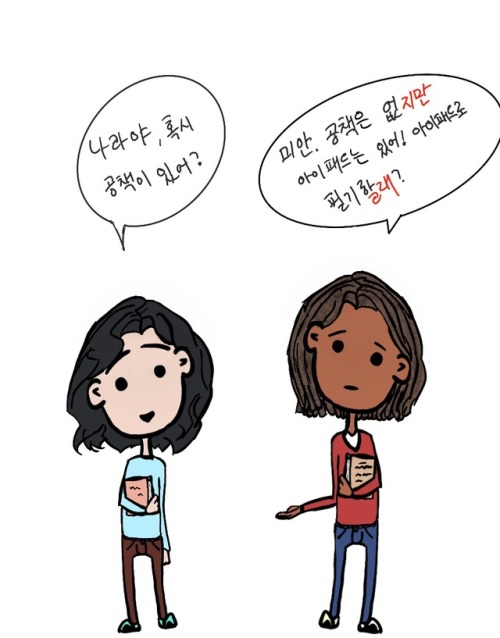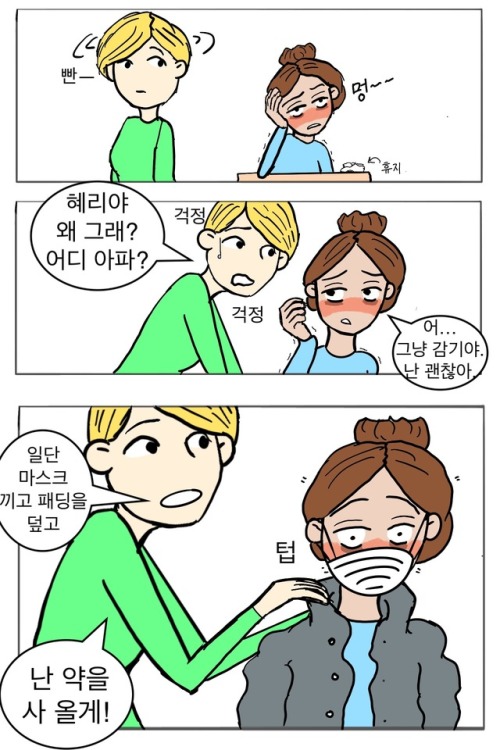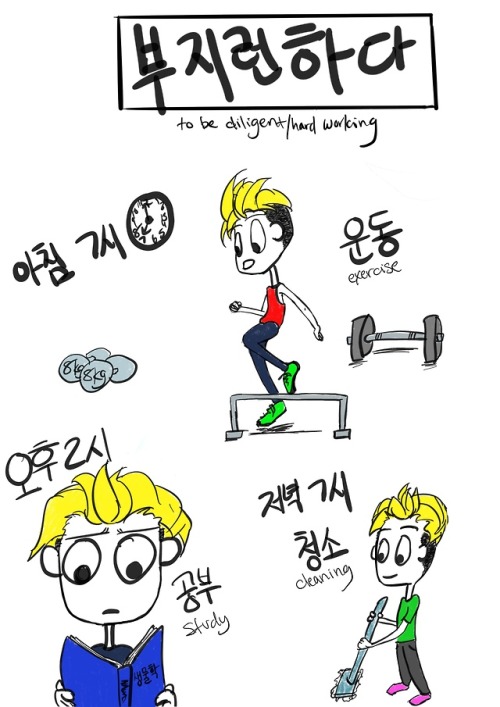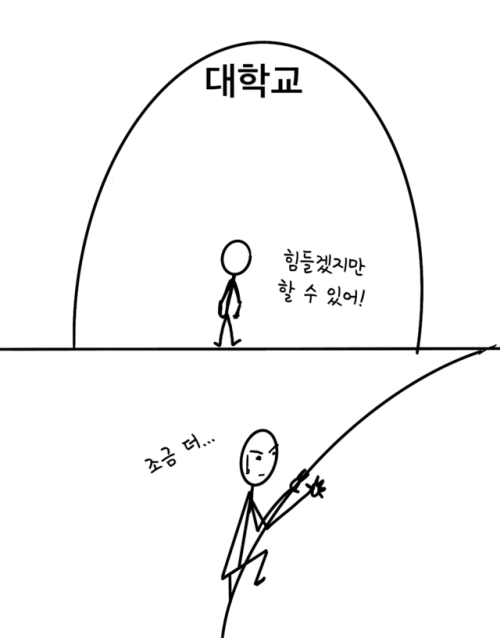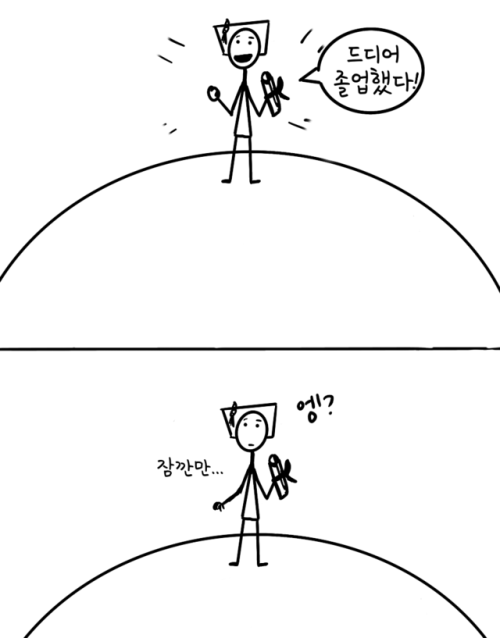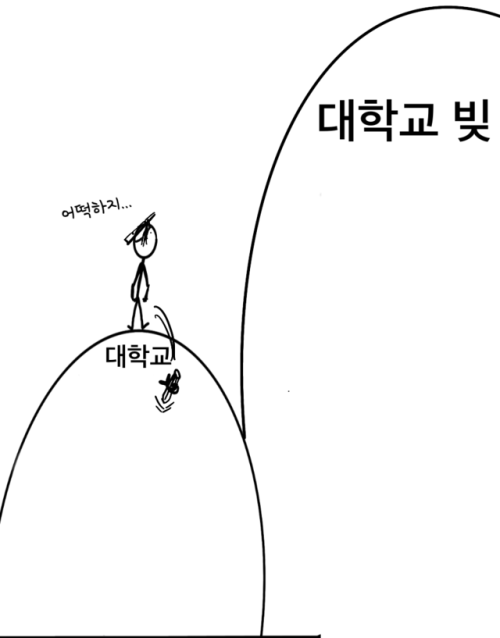#한국어공부
VOCABULARY WORDS #2 (어휘)
Family - 가족
Grandfather - 할아버지
Grandmother - 할머니
Father - 아버지
Mother -어머니
Younger brother - 남동생
Younger sister - 여동생
Son - 아들
Daughter - 딸
Husband - 남편
Wife - 아내
Younger sibling - 동생
(from a male perspective)
Older brother -형
Older sister - 누나
(from a female perspective)
Older brother - 오빠
Older sister - 언니
Interrogative pronouns
Who - 누구
Who - 누가 (누구+가(subject marker))
What - 무슨
Personal pronouns
My - 나의 / 내 /제
Our - 우리
(honorific)
This person - 이분
That person - 그분
That person - 저분
Other helpful vocabulary words:
Company - 회사
To work for / to go to - 다니다
Flower - 꽃
Rose - 장미
Library - 도서관
Morning - 아침
Nurse - 간호사
Counting unit for people - 명
College student - 대학생
To love - 사랑하다
to be right - 맞다
Really - 정말
Photograph - 사진
To be pretty - 예쁘다
To marry - 결혼하다
Last year - 작년
[ActiveKorean2]
Hi, it’s been a long time since I posted here and decided to be active again. As of the moment, I can’t think of any korean related lesson to post. Any suggestions? :)
VERB PER DAY #3
하다 - to do
Past tense - 했어요
- A:어제 뭐 했어요?
- What did you do yesterday?
- B:나의 숙제를 했어요.
- I did my homework.
어제 - yesterday
뭐 - what
나의 - my
숙제 - homework
Present tense - 해요
- A:무슨 일을 해요?
- What work do you do?
- B: 저는 의사예요.
- I am a doctor.
무슨 - what; what type; what kind
일 - work
의사 - doctor
Present progressive - 하고 있어요
- A:뭐 하고 있어요?
- What are you doing?
- B:운동을 하고 있어요.
- I am exercising.
운동 - exercise (noun)
Future tense - 할 거예요
- A:너 왜 이렇게 빨라요?
- Why are you so fast?
- B:제 친구가 기다려서 내가 이거를 그냥 빨리 할 거예요.
- My friend is waiting so I’ll just do this quickly
너 - you
왜 - why
이렇게 - so; in a manner; in a way; like this
빠르다 - to be fast (빨라요 - present tense)
제 - my
친구 - friend
기다리다 - to wait
이거 - this
그냥 - just
VERB PER DAY #2
보다 - to see
Past tense - 보 + -았어요 = 봤어요
- 어제 뭐 했어요?
- What did you do yesterday?
- 친구랑 같이 영화를 봤어요.
- I watched a movie with my friend.
Present tense - 보 + -아요 = 봐요
- 요즘 뭐 해요?
- What do you do these days?
- 영화를 봐요.
- I watch movies.
Present progressive - 보 + -고 있어요 = 보고 있어요
- 지금 뭐 하고 있어요?
- What are you doing now?
- 지금 텔레비전을 보고 있어요.
- I am watching TV now.
Future tense - 보 + -ㄹ 거예요.
- 내일 뭐 할 거에요?
- What will you do tomorrow?
- 내일 공원에서 폭죽을 볼 거예요.
- I will watch fireworks tomorrow at the park.
VERB PER DAY #1
먹다 - to eat
Past tense - 먹었어요
- 저는 어제 피자를 먹었어요.
- I ate pizza yesterday.
Present tense - 먹어요
- 오후 열두 시에 점심을 먹어요.
- I eat lunch at 12 pm.
Present progressive - 먹고 있어요
- 지금 빙수를 먹고 있어요.
- I am eating bingsu now.
Future tense - 먹을 거예요
- 나중에 친구들이랑 냉면을 먹을 거예요.
- I will eat naengmyeon later with my friends.
VOCABULARY WORDS #1
The following words are words that are commonly used in a daily conversation. These are helpful and good to know especially to those who are still in a beginner level and to those who are still building up their vocabulary in Korean.
*자주 - frequently / often
*가끔 - sometimes
*거의 - almost
*계속 - continuously
*똑바로 / 바로 - straight
*좀 - please
*가장 - most
*먼저 - ahead / first
*우선 - in the first place
*매우 / 무척 / 아주 - very
*너무 - too / so
*얼마나 - how long/much/many
*정말 - really
*참 - really / very
*많이 - many
*약간 - a few / little
*전혀 - none / not at all
*잘 - well
*일찍 - early
*이따가 - later
*못 / 안 - not
*더 - more
*모두 / 다 / 전부 - all / whole
*또 / 다시 - again / once more
*따로 - separately
*주로 - mainly / usually
*간단히 - simply
*갑자기 - suddenly
*빨리 / 어서 - fast / quickly
*천천히 - slowly
*같이 - together
*벌써 - already
*곧 - soon
*새로 - newly
*금방 - soon
*방금 - just now / seconds ago
*늘 / 항상 - always
*조용히 - quietly
*열심히 - eagerly
*언제나 - whenever
*오래 - for a long time
*없이 - without
*아까 / 좀전에 - a while ago
*특히 / 특별히 - especially
*아직 - yet
*미리 - in advance
*바로 - right now
*직접 - directly
*깜빡 - with surprise
*꼭 - firmly / just
*아마도 - probably
*별로 - particularly
*그냥 - just
*서로 - with each other
learn korean
hi i previously made a post about learning korean the “lazy way” so i was thinking about making one about the “cute way”
what do u think??? do u want me to make the post? pls lemme know!!
learn korean : the lazy way
you may have already been in that situation where you’re trying to communicate with a native korean via texts but somehow aren’t able to distinguish some words because they’re written a certain way. well as well as in english or any other languages korean also has its lazy way of using it. we’ll see some words in their correct form and then in their “lazy/text” form.
이렇게 (like this) : 이러케
그렇게 (like that) : 그러케
어떻게 (how) : 어떠케, 어케
왜 이/그렇게 (why are u so…) : 왤케
그렇구나 (i see) : 그러구나
~고 싶다 (to want) : 고시퍼
귀엽다 (to be cute) : 겹다
- conjugated : 귀여워->기어워/여워,키여워/어워
괜찮아 (its okay) : 괜차나,갠차나
싫어 (to hate) : 시러
맞아 (to be right, correct) : 마자
전화 (phone) : 저나
~잖아:자나
미안해 (to be sorry) : 미아내, 먄
ㄱㄱ (고고) : let’s go
ㄴㄴ (노노) : no
ㄷㅊ (닥쳐) : shut up
ㅇㅋ (오키) : okay
ㅂㅇ (바이) : bye
ㅎㅇ (하이) : hi
ㅇㅈ (인정) : i admit
ㄱㅅ (감사) : thanks
“today’s korean”
hey yall~~
i’m planning on starting kind of a serie of posts with no specific subjects ; i’ll just be discussing random things i discover or learn such as words, expressions, grammar points etc.. when i feel like i have stuff to share with u and that could be useful!hope you’ll like it!^^
korean learning chat
hello everyone! i had some trouble w my kkt account so it removed me from the korean learning chat i created. i created a new one so please join this one instead of the old one ^^ thanks! https://open.kakao.com/o/g2oSB5Y
♥︎︎︎︎ random korean slangs/expressions pt.1
•뭐하고 지내요?
“what are you up to?”
it literally says “what are you doing and how are you?”
•까먹었어!
“i forgot!”
it’s an informal term for “잊어버리다” (to forget)
•씹다
“to ignore a text”
you may wanna use that verb when someone ignores your texts. “씹새끼” is a slang refering to people who ignore others people texts ; its rude so use that only when joking with your friends!
•친하게 지내요
“get along well”
you would use that when meeting someone for the first time and wish you can become friends/more friendly
•친추하다
“to add someone in your friend list”;“to become friends with someone (online)”
친추하자 = let’s add each other
친(친구) friend + 추(추가하다) add

how to : multiple verbs sentences in korean
helloooooo. so in this post i will be explaining you all how to use multiple verbs in the same sentence.
before learning this, make sure you already kinda master how to conjugate verbs in past, present and future tenses and also know how to use basic sentence structure:)
it will look like Verb stem+고+Verb
-고 is added to verbs you want to link together in order to form your sentence
a simple way to say “and” is using the word “그리고” :
“학교에 갔어요. 그리고 친구랑 만났어요.”
i went to school. and i met with friends.
but let’s say you want to say something like :
“i am studying and listening to music”
공부하고 음막을 들어요
- present tense:
먹다 = 먹-다 = 먹+하고 = 먹고 “eat and…”
말하다 = 말하다-다 = 말하+고 = 말하고 “talk and…”
보다 = 보다-다 = 보+고 = 보고 “see and…”
- past tense :
읽다 = 읽었다-다 = 읽었+고 = 읽었고 “read and…”
좋아하다 = 좋아했다-다 = 좋아했+고 = 좋아했고 “liked and…”
배우다 = 배웠다-다 = 배웠+고 = 배웠고 “learned and…”
- future tense :
노래하다 = 노래할 거+고 = 노래할 거고 “i will sing and…”
찍다 = 찍을 거+고 = 찍을 거고 “i will take a picture and…”
보다 = 볼 거+고 = 볼 거고 “i will see and…”
- more examples :
- “i cooked and ate”
요리했고 먹었어요
- “what are you up to?”
뭐하고 지내요?
“i’m doing well and working”
잘 지내고 일해요
- “i went shopping and watched a movie”
쇼핑하러 갔고 영화를 봤어요

Today, I have two beginner grammar points! A/V지만 and V(으)ㄹ래. They are quite simple, but this post ended up being much longer than I thought it would.
지만 is a way to express opposing situations or “but.” It’s simple and to the point.
Luckily verbs and adjectives are conjugated the same way with 지만.
Present tense: All you have to do is remove the dictionary 다 from the verb/adjective and add 지만.
좋아하다
너를 좋아하지만 우리는 사귈 수 없어. I like you, but we can’t date.
먹다
저는 야채를 잘 먹지만 과일을 잘 안 먹어요. I eat vegetables well (often, a lot), but I don’t eat fruit well (often, a lot).
좋다
이 신발이 좋지만 너무 비싸요. These shoes are good, but they’re too expensive.
나쁘다
그 남자는 성격이 나쁘지만 잘 생겼어요. That guy’s personality is bad, but he’s handsome.
And, it can be used with nouns as well in the form of (이)지만.
Nouns that end in a consonant get followed by 이지만 (ex: 선생님이지만), and nouns that end in a vowel get followed by 지만 (ex: 실례지만).
저는 선생님이지만 어렸을 때 학교 가기 싫었어요. I’m a teacher, but I hated going to school when I was young.
그 사람은 우리 오빠지만 우리는 안 닮았어요. That person is my older brother, but we don’t look alike.
저는 학생이 아니지만 어려 보여서 학생 할인을 받았어요. I’m not a student, but I got the student discount because I look young.
지만 can also be used with the past tense. All you do is add 지만 to the past 았/었/였.
좋아했지만 // 먹었지만 // 좋았지만 // 나빴지만 // 학생이었지만 // 오빠였지만
It can be used with other grammatical constructions as well, but I’ll leave them out to keep this beginner.
———————————————————————————————————
V(으)ㄹ래 is also a rather simple grammar point. When I learned (으)ㄹ래, the book taught it as another future tense “will.” And because of that, I confused it with the other future tenses like (으)ㄹ 거예요 and (으)ㄹ게요. But, luckily they are all quite different from each other in usage. V(으)ㄹ래요 is used when someones will or want is involved. It’s a very strong way to say “I will” do something or “want to” do something.
For example:
A 집에 가서 공부 할 거예요. I will go home and study.
B 집에 가서 공부할래요. I will go home and study.
These two sentences are actually very different. The first sentence (A) just states that you’re going to go home and study, it doesn’t necessarily mean that you want to study at home. It’s just something that will happen. But the second sentence (B) means that this is what you want to do. You want to study at home. It can emphasize that you want to do the action (studying), or it can emphasize that you want to do the action specifically at your house. And probably not where you are now.
Let’s look at another example.
A 나랑 같이 갈 거야? Are you going with me?
B 나랑 같이 갈래? Will you go with me? (Want to go with me?)
These are also very different. Sentence A can be used to ask for information. “Are you going with me?…or with someone else? or…?” But sentence B asks about that persons will. “Will you go with me?/Do you want to go with me?”
Let’s look at some more examples of (으)ㄹ래.
으으…소개팅 하기 싫어. 안 갈래. uhh…I don’t want to have a blind date. I’m not going./I won’t go.
여기 좀 시끄러워서 도서관에 가서 공부할래요. This place is a bit loud, so I’ll go to the library and study.
뭐를 먹을래(요)? What do you want to eat? (informal) 뭐를 드실래요? What do you want to eat? (Formal/respectful)
난 절대 결혼하지 않을래. I will never get married.
너가 가. 난 여기 있을래. You go. I’ll stay here. (I want to stay here./I’m going to stay here.)
note: (으)ㄹ게 also means “I will,” but it’s mostly used when making promises or saying “I will” do something for someone else (favors, promises etc).
A: 문닫아야 겠어. 추워. I better shut the window. It’s cold.
B: 앗 내가 닫아 줄게. Ah, I’ll shut it (for you).
If I say, 내가 닫을래/닫아 줄래 (I will shut it/I will shut it for you), it sounds like I’m saying “Don’t close it, I want to be the one to close it!” In that sense (으)ㄹ래 is the strongest “will” among the three. To organize it quickly in a simple guide for beginners:
(으)ㄹ 거야/거예요 - general information about the probable future
(으)ㄹ게(요) - will do something for someone else
(으)ㄹ래(요) - will do something because I want to do it
This might be more confusing than it should be. So, please leave any messages if something needs clarification. And, I good luck studying everyone!
I hope you all had a good weekend! Follow me if you want to keep seeing more Korean posts.^^
Post link
Translation:
새벽 3시 - 3am
3년동안 사귀었는데 카톡으로 갑자기 헤어지는 거 말이 돼애애? We dated for three years…does suddenly breaking up over text make any sense???
*This phrase is like “We dated for three years…and you break up with me over text?? WTF??” kind of anger. 말이 돼? is like asking “does that make sense” in a WTF kind of way. It doesn’t translate smoothly in English, but it’s a common expression in Korean.
흥분된 상태 - excited state
분노 - rage
——-
새벽 3시 - 3am
내일 너무 기대돼서 잠이 안 오네. I’m so excited for tomorrow that I can’t sleep. (“sleep isn’t coming”)
——-
흥분하다 is a word that many Korean students use incorrectly, and that’s because of the translation. 흥분하다 translates to “to be excited.” And, that’s because it means a sudden rush of emotion.
The problem is that many students want to say something like “I’m excited to go to Korea.” 저는 한국에 가는 것에 흥분해요. (X)
But, this is not how to express that feeling. There is a much better expression. 기대되다. Now, this word is translated as “to expect.” And while, it can be used to express expectations, it’s also used to express “Looking forward to”/“excited for something.”
This is also why many Koreans will say “I’m expecting it,” when they want to say “I’m looking forward to it.”
So, let’s look at how we can use these correctly.
흥분되다/하다
그 사람이 우리 언니를 욕하는 것을 듣고 흥분해서 싸울 뻔했어요. (After) I heard that person talk badly about my sister, I was so “upset” that I almost fought them.
*In this case, 흥분하다 could be seen as “upset.” A rush of angry feelings that made the heart race.
대학교에 합격한 걸 듣고 너무 흥분해서 도서관에서 소리를 질렀어요. (After) I heard that I was accepted into college, I was so excited that I yelled in the library.
괜찮아. 흥분하지 말고 일단 해결할 방법을 생각해 보자. It’s okay. Don’t get worked up, instead let’s think of a solution first.
흥분된 목소리 an excited voice
기대되다/하다
내일 한국에 가서 넘나 기대돼요. I’m so excited, because I’m going to Korea tomorrow.
오늘 데이트 해서 진짜 기대돼요. I have a date today, so I’m really excited.
내가 쓴 글을 기대하지 마. 완전 쓰레기야ㅋㅋㅋ Please don’t look forward to the thing I wrote. It’s completely garbage.
내일 캡틴 마블이란 영화를 볼 거야. 너무 기대돼. Tomorrow I’m going to see the movie Captain Marvel. I’m really looking forward to it.
Note: The difference between 되다 and 하다 is important when understanding these to words. Because 기대되다 and 기대하다 are slightly different. 하다 is used to refer to something that you are actively doing at the time you’re talking about it or in the past. 되다 typically refers to more passive actions or something that is true, but not necessarily using all your attention.
So, 기대되다 is being excited. You’re in that state passively.
But 기대하다 is a constant state of that excitement or expectation. Which is why we say 기대하지 마. Don’t be excited. Because it’s a little strange to say 기대되지 마 “Don’t become excited" in Korean. Because 되다 refers to something out of your control most of the time. That’s why it’s passive. So, it’s strange to say don’t “become” excited when you have no control over it.
Anyway, good luck everyone! 기대되다(to be excited for, to look forward to) is a great word to use. It’s used all the time. Unlike 흥분되다, which is not overly common in comparison. And also, 흥분 is used as “sexual excitement,” so, you don’t want to say 내가 흥분했다 in the wrong situation. It might become awkward.
Follow me for more Korean posts in the future. I have a new “guide” that I’m working on right now. So, I hope to finish it and give it to you guys to practice soon!
Post link
번역 - translation
1. *빤– *stare / *멍–stare into space/out of it / 휴지 - tissue
2. *걱정, 걱정 - worry, worry (worried, worried)
혜리야 왜 그래? 어디 아파? Hyeri, what’s wrong? Are you sick (somewhere)?
어…그냥 감기야. 난 괜찮아. Yeah…it’s just a cold. I’m okay.
3. 일단 마스크 끼고 패딩을 덮고 난 약을 사 올게! First of all, wear (this) mask and cover up with (some) padding, and I will go get some medicine.
*텁 - *places/puts*
Notes
*padding = fluffy/puffy winter jacket
*Noun을/를 사 오다/가다. = This is a rather common expression. I’ll buy something and come/go. It’s used often when buying something on your way to a different place or when you’re going to buy something and come back.
*배 고파? 뭘 사 갈게. Are you hungry? I’ll buy something and go./I’ll buy something on my way there.
Vocabulary related to colds.
감기에 걸리다 to catch a cold / 독감에 걸리다 to have(catch) the flu
김기에 걸렸어요. I caught a cold.
감기 끼가 있다 to have the feeling you’re coming down with a cold
감기 끼가 있어서 오늘 못 만날 것 같아요. It feels like I’m coming down with a cold, so I don’t think I can meet today.
목감기 sore throat (like when you have a “cold” but your only symptom is a sore throat) / 코감기 stuffy nose (similarly, when your symptoms are only a stuffy nose)
감기가 유행이다 this is technically “colds are trending,” but 유행하다 is used to express that something is common, so it’s a phrase to say that everyone is catching a cold these days.
요즘 감기가 유행이라서 조심하세요. Be careful not to catch a cold (since they are so common these days).
증상 symptom(s)
증상이 어떠세요?/어때요? What are your symptoms? (literally “how” are your symptoms?)
머리가 아프다 to have (your/someone’s) head hurt, to have a headache / 배가 아프다 to have (your/someone’s) stomach hurt, to have a stomachache / 열이 나다 to have a fever / 코가막히다(막혔다) to have a stuffy nose *often used in past tense*
어지럽다 to be dizzy / 기침하다, 기침나다 to cough / 코가 간지럽다 for (your/someone’s) nose to be itchy / 콧물(이) 나다 to have a runny nose / 몸살 나다 to ache all over one’s body (from a cold or fatigue) / 재채기하다, 재채기나다 to sneeze
Post link
Today, I thought we should add a new hanja to the list: 力 - 힘 력/역. So, 力 means 힘 (power) and it is pronounced as 력(역 when it’s at the beginning of a word - but that is less common). 력 is a very common hanja in Korean. So, it’s great to be able to recognize it when words have something to do with strength, power or ability (strength to do something).
Here are common words seen with 力(힘 력/역).
집중력 ability to focus / 기억력 memory (ability to remember) 노력 effort (strength to put in effort, try, work) / 폭력 violence / 권력 power, authority / 능력 capability (power to be able to something) / 협력 cooperation (ability to work together) / 매력 charm (power to captivate, charm someone) /실력 ability (power of a skill) / 체력 strength, stamina (strength of the body) / 창의력 creativity (ability to be creative) / 중력 gravity /시력 eyesight (strength of the eyes) / 이해력 ability to understand something
Here are some example sentences.
우와 10년 전에 일어난 일을 그렇게 잘 기억해? 기억력이 대단하네. Wow, you can remember that thing that happened ten years ago that well? Your memory is amazing.
노력하면 다 잘 될 거야. If you try(put in effort), it will all work out.
그 여자는 매력적이에요. That woman is really charming.
어제 밤에 클럽 가고 나서 오늘 아침에 출근했다고? 헐 니 체력이 쩔어 ㅋㅋ You went to work this morning after going to a club last night?
우리 언니는 이해력이 좋아서 어려운 시험 문제를 쉽게 풀 수 있어요. My older sister’s ability to understand things is really good, so she can easily solve difficult test problems.
능력 and 실력 are two words that often confuse people since they can both be translated to ability or capability. They are quite similar, but still different. 능력 can be seen as an ability a little more innate or something that you’re born with, while 실력 is something you can improve or aquire. Which is why 능력 is normally used with 있다 and 없다 because you either have it or you don’t. But, 실력 can be used with words like 좋다, 나쁘다, 있다 and 없다. Because you can also acquire skills if you put in effort.
우리 팀장님은 진짜 능력이 있으세요. 실수 한번도 하신 적 없어요. Our team manager is really capable. She has never even made one mistake.
요즘 너 한국어 실력이 진짜 좋아지고 있는 것 같아. These days it seems like your Korean skills are really improving.
And do you remember the hanja 없을 무? 무 can be added to the word 중력 (gravity) to become 무중력 (zero gravity).
Next time you see 력 in a vocabulary word, ask yourself if it has anything to do with strength or power. Even take a moment to look it up! Hanja often helps me understand the true meaning of different vocabulary and remember them better. So, I hope it helps you too!
Good luck studying.
Follow me for more Korean tips and lessons~ and content.^^
Post link
Hi guys~ I made a tea rating system for my posts so that you can know right away what level you’re going to be reading. I hope it’s useful. Today, I’m going to be talking about introducing yourself in Korean for both beginners and intermediate Korean learners. So, I’ll start by saying hi.

Thankfully, introducing yourself in Korean is pretty easy. Beginners can use a basic 안녕하세요? (Hello) and then your name +이에요/예요.
And the difference between 이에요 and 예요 is easy.
이에요 is used if your name ends in a consonant sound(ㄱㄴㄷㄹㅁㅂㅅㅇㅈㅊㅋㅌㅍㅎ) and 예요 is used after a vowel sound (ㅏㅓㅗㅜㅡㅣㅐㅔㅚㅟㅢㅑㅕㅛㅠㅒㅖㅘㅝㅙㅞ).
Here are some examples and ways to introduce yourself.
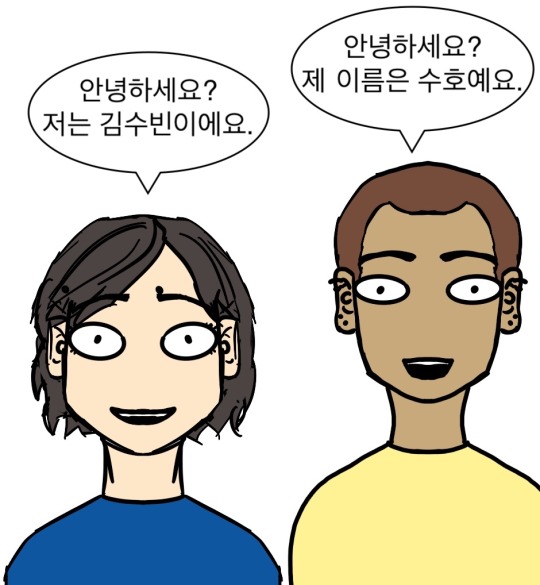
안녕하세요? 저는 김수빈이에요. Hello, I’m Subin Kim.
*수빈 ends with the consonant ㄴ, so 이에요 must be used.
안녕하세요? 저는 수호예요. Hello, I’m Suho.
*수호 ends with the vowel ㅗ, so 예요 must be used.
Or, you can use the words 제 이름 (my name) like in the picture above.
안녕하세요? 제 이름은 김수빈이에요. Hello, my name is Subin Kim.
안녕하세요? 제 이름은 수호예요. Hello, my name is Suho.
입니다 is used in formal speeches or maybe at a company, or sometimes between men. (Women don’t use it as often in informal situations). You might see it often on the news or when idols introduce themselves on TV shows.
For example:
안녕하세요? 저는 유키입니다. Hello, my name is Yuki.
Or you can use the more advanced phrase (이)라고 하다 (I am called).
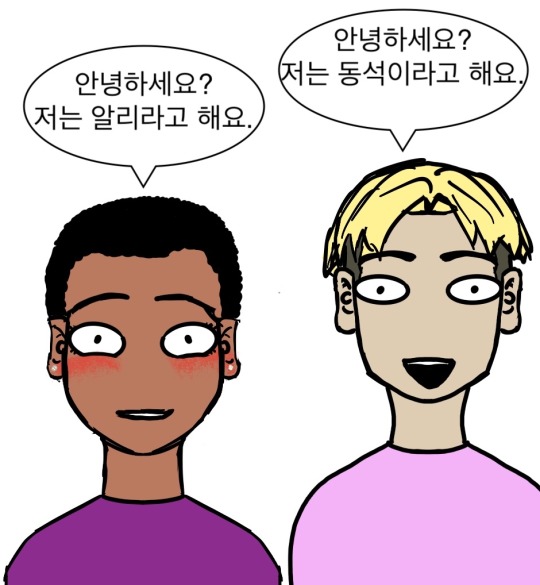
안녕하세요? 저는 알리라고 해요. Hello, I’m called Allie.
*알리 ends in the vowel ㅣ, so 라고 하다 is used.
안녕하세요? 저는 동석이라고 해요. Hello, I’m called Dongseok.
*동석 ends in the consonant ㄱ, so 이라고 하다 is used.
As with the first introductions, 라고 하다 is attached to names that end in a vowel, and 이라고 하다 is attached to names that end in a consonant.
“I’m called NAME” might sound a little awkward in English, but it’s a really common way to introduce yourself. *The phrase “name(이)라고 부르다(불러요)” is taught in some books, but is not a common introduction. You might use it to say: My name is Thomas, but please call me Tom. 제 이름은 토마스지만 톰이라고 불러 주세요.*
For school clubs or slightly more formal introductions, it’s common to use the formal version of (이)라고 하다, which is (이)라고 합니다. It’s used often if you’re introducing yourself in front of many people at one time like when joining a school club or being forced to introduce yourself to a class.
For example:
안녕하세요? 저는 제임스라고 합니다. Hello, I’m called James.
And now you might be wondering about an informal way to introduce yourself. Well, I’ve got you covered. You can say 안녕 (informal hi) and then you can add 이야 to the end of your name if it ends with a consonant and 야 to the end of your name if it ends in a vowel.
Or you can use the intimate speech level with (이)라고 하다, which is (이)라고 해.
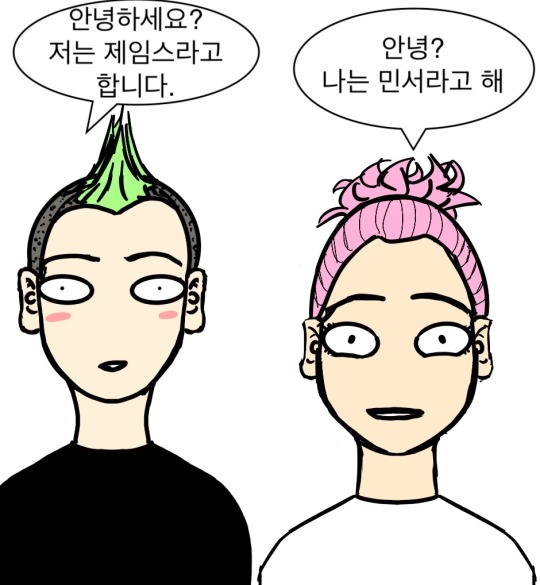
For example:
안녕? 나는 수호야. Hi, I’m Suho.
안녕? 나는 동석이야. Hi, I’m Dongseok.
안녕? 내 이름은 알리야. Hi, I’m Allie.
안녕? 나는 민서라고 해. Hi, I’m called Minseo.
But, honestly, unless you were meeting a child, you probably wouldn’t introduce yourself this way. And even then, the child wouldn’t use your name, so you might not even say it. Even though it’s common to use informal speech (반말) to people younger than you, most people start talking in formal speech because it is polite, and you’re not close yet.
But people who meet in elementary to high school might greet this way, because they know their classmates are the same age as they are. So, you’ll see this informal introduction in high school dramas or webtoons.
And if you’ve read to this point, you’re probably thinking all this is great, but there are so many options. What one do I use? So, here’s my personal opinion. I think the best two options on this list are 저는 ㅇㅇ예요/ㅇㅇ이에요 for beginners and 저는 ㅇㅇ(이)라고 해요 for anyone. The first one is simple and absolutely acceptable, and the second one, while being extremely common, sounds a bit more advanced and natural. So, you can show off your skills a bit. And if you’re introducing yourself in front of a class or something, 저는 ㅇㅇ(이)라고 합니다 is a great choice.
If you have any questions, leave a comment.
And follow me for useful Korean lessons and tips!^^
Post link
This is a post I made when I first started this blog, but I thought I’d bring it back since it’s a really great word. 부지런하다 is a word that you hear quite often in Korea. It normally translates to diligent or hard working.
It’s used all the time as a response to hearing that you’re doing something that’s good for your mind or body.
So, if you wake up early to exercise or study instead of watching Netflix, you’re probably going to hear the phrase: 부지런하네요~
Here are two examples.
오늘 아침에 일찍 일어나서 운동했어요. I woke up early and exercised this morning.
우와 정말 부지런하네요. Wow, you really work hard./You’re really diligent.
우리 오빠는 숙제를 미리 하는 편이에요. 저보다 부지런하죠?ㅋㅋ My older brother always does his homework in advance. He works a lot harder than I do, huh? Haha
It’s basically used to praise someone for something that most people are too lazy to do or don’t like doing. It’s a great word. After learning this phrase, I realized why my Korean friends used the word “diligent” so often.
Anyway, as always! Follow me for more Korean language posts.
Post link
Today I have another 속담(proverb/old saying). 산 넘어 산이다.
This one is one of my favorites. Life is full of challenges one after another. And this proverb illustrates just that feeling.
So, let’s first break 산 넘어 산이다 down. 산 means mountain(s), 넘다 means to climb over, pass, cross, and 산이다 is 산(mountain) plus the copula 이다 (similar to “to be”).
산 넘어 산이다. Literally means something like “there is (another) mountain after going over a mountain.”/ “Go over the mountain and there is another mountain.”
It’s used to express discontent that there is “one problem/challenge after another.” Once you finish one challenge, another one appears.
So, like the pictures, American college students are in a debt crisis. So, it’s probably pretty relatable for some of you. I just struggled to get through college! So, now I should be okay. But, the moment I finish my first challenge (getting through college), I’m immediately faced with another challenge (paying off college debt).
With life always putting new problems, barriers and challenges in front of us, this is a great expression. Here are some examples.
산 넘어 산이라고 대학교를 졸업하자마자 학비를 갚아야 돼요. “It’s just one challenge after another.” As soon as I graduate, I have to repay my school costs.
인생은 쉽지는 않지. 산 넘어 산이라고 하잖아. Live isn’t easy. They say it’s one hardship after another you know.
A: 민경아, 취직했다면서? 축하해! Mingyeong. I heard you got a job? Congratulations!
B: ㅋㅋ 고마워..취직을 하긴 했는데 다음 주 영어 시험을 봐야 된대. 산 넘어 산이야. haha Thank you…I did get a job, but they said I have to take an English exam next week. It’s just one thing after another.
Let me know if you have any questions. Good luck studying everyone! I hope you don’t have too many mountains to cross while studying Korean!
Post link



